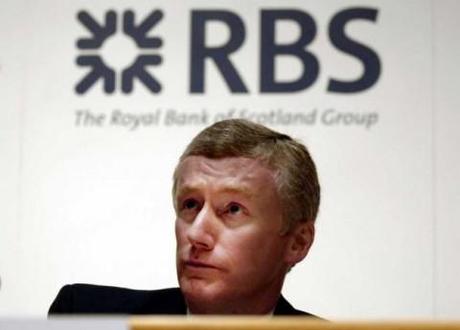
Fred Goodwin: Where's my knighthood? Photocredit: PA
It is now official: Fred “the Shred” Goodwin has been deprived of his gong. Sir Fred is no more. Justice has been done and has been seen to be done, punishment has been meted out and bankers now know their place. Anyone reading much of the comment on this subject since this story broke would be forgiven for thinking that all of the Square Mile’s ills and the woe of a recession had been vanquished by this single act alone.
I should make one thing clear before anything else: I am no great supporter of Fred Goodwin and I have no problem, as a matter of practice, with the removal of his honor. My problem is with the principle and where we are left now.
Why, for instance, has this happened now? The point is moot. The official reason, according to the London Gazette, is thatGoodwin had “brought the honours system into disrepute”. But what counts as disrepute?
It appears that that the timing of the actual sanction follows a critical report by the Financial Services Authority which, it has been said, amounts to a “censure” of Goodwin. Yes, but surely nothing which we didn’t know already? Accounts of Goodwin’s reckless conduct are legion and his follies are well documented.
Reports this week, in fact, suggest that the former Sir Fred had been acting as a financial adviser to HM The Queen’s personal charity, the Silver Jubilee Trust, until days prior to the announcement. In this context, the sudden urge to remove the honor sits uneasily. One doesn’t get this sort of appointment by accident or without vetting or official consideration. Clearly a large number of people (Her Majesty’s advisors included) had no problem with Goodwin continuing to provide financial advisory services at the highest level until very recently.
Everyone knows that Goodwin was honoured in 2004 for his services to banking by the Brown administration. So the logic goes, since the bank which he led had to be bailed out by taxpayers to the tune of an alleged £45.5 billion and is now a quasi-nationalised firm, the honor must be withdrawn.
In the first place, this begs the question of principle: is an honor a recognition for things achieved or a carrot dangled in the lively expectation of further achievements to come? Surely the dominant purpose is the former: a recognition at the prime of a person’s career that they have made a material and worthy contribution to the life and fabric of the nation? An honor must be evaluated primarily on achievements prior to and at the date of the honor. No one denies that Goodwin had achieved something of note prior to 2004.
While an honor is not given conditional on good behaviour, I would accept, of course, that in an exceptional case an honor should be withdrawn. But is this case really exceptional or, if it is, are there other equally exceptional cases?
My concern also relates to the standard of conduct required for removal of an honor. It has been the received wisdom of decades that a knighthood might only be removed in the event of a criminal conviction or similar, hence the removal of knighthoods from Sir Anthony Blunt et al. Absent a conviction, a holder had to act as badly as dictators Robert Mugabe or Nicolae Ceausescu.
Goodwin has not faced, and will not in all likelihood face, any form of criminal sanction for his acts or any government-initiated civil claim.
Consider, then, those who retain their knighthoods and who ought to take some share of responsibility for the financial crisis, including former Lloyds TSB Chairman Sir Victor Blank and ex-HBOS chief Sir James Crosby. And what of other transgressors, now forgotten, such as Dame Shirley Porter of the Westminster Council “homes for votes” saga? She faced a judgment debt of a reported £27 million and was condemned by District Auditor John Magill (along with David Weeks) of “willful misconduct” following an investigation.
True, Dame Shirley later paid back £12 million to Westminster pursuant to a published settlement but that doesn’t really expunge her conduct.
The point is that, objectional though he is and his actions were, Goodwin’s treatment in this way is inconsistent and sets no clear precedent for future cases. Although the removal of a knighthood is in the gift of the Crown, HM The Queen acts on the recommendation of a panel of top civil servants. It is an administrative act. Although such a decision would probably be liable to judicial review through the courts if exercised perversely, no embarrassed former knight is likely to want to drag the issue through the Courts and, thereby, be pilloried for a selfish action while prolonging the pain. We cannot, therefore, expect judges to bring clarity to this debate.
If the power of removal is to be revisited more frequently as and when a knight crosses a line they – and we – need to know where that line is to drawn.

